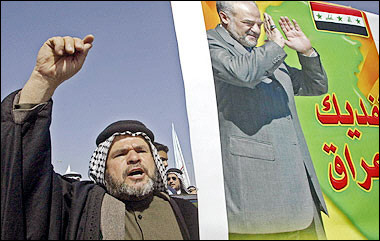|
Iraq political deadlock as PM row deepens
(AFP)
Updated: 2006-03-08 09:35
Iraq was plunged into political deadlock as the dominant Shiites opposed
efforts by President Jalal Talabani to convene parliament amid bickering over
who should lead a government of national unity.

An Iraqi man
demonstrates in support of embattled Prime Minister Ibrahim Jaafari during
a demonstration to support him in the southern city of Basra. Iraq was
plunged into political deadlock as the dominant Shiites opposed efforts by
President Jalal Talabani to convene parliament amid bickering over who
should lead a government of national unity.
[AFP] |
The dispute came amid increasing
violence which saw at least 16 killed and in 18 attacks, eight of them car
bombs, as two Canadians and a Briton kidnapped in Iraq appeared in a new video
message appealing for their release.
And in the south of the country, an Iraqi security official accused British
soldiers in Basra of shooting and wounding four Iraqis, among them police
officers, after police tried to check their identification.
Talabani, a Kurd, along with Kurdish, Sunni and secular factions, opposes the
reselection by the Shiite United Iraqi Alliance (UIA) of outgoing Prime Minister
Ibrahim Jaafari to head the national unity government.
The opening of Iraq's new parliament, which Talabani wanted to convene on
Sunday, has now fallen victim to the high-stakes political gamesmanship.
"The Alliance is going to ask for the opening of parliament to be delayed by
a few days to allow for further talks between the parties," Redha Jawad Taki, a
spokesman for the Supreme Council for the Islamic Revolution in Iraq, the main
Alliance party, told AFP.
"If the president rejects this then we shall boycott the assembly's inaugural
meeting."
Earlier, a top government official said one of the vice presidents, the
Shiite Adel Abdul Mahdi, had declined to sign the presidential council order for
the assembly to meet.
"All three members of the presidential council have to sign the order
announcing the start of the parliament and Mr Mahdi has not yet signed for
reasons best known to him," the official said on condition of anonymity.
"Due to this there is a possibility that the parliament may not convene on
March 12 as there is also a strong demand from the Shiite leaders to postpone
it," he added.
The presidential council consists of Talabani, Mahdi and Vice President Ghazi
al-Yawar, a Sunni.
Parliament was elected nearly three months ago and its make-up only confirms
the deep national split along sectarian and ethnic lines.
The UIA can count on the support of 130 of parliament's 275 MPs, but does not
have the necessary majority to rule alone.
The United States has urged Shiite leaders to agree to a broad-based
governmental coalition in a bid to win support from the Sunni minority and
undermine its support for the insurgents.
Talabani and others have accused Jaafari of being too sectarian at a time
when sectarian violence between majority Shiites and historically-dominant
Sunnis is rising.
In violence across the country, four policemen, including a police colonel,
were killed and four wounded when gunmen aboard three cars machine-gunned their
patrol in Baiji, just north of Baghdad.
Nine more people died in a string of attacks in Baghdad, Hilla, to the south,
Baquba, to the northeast, and Hawija, in northern Iraq, police said.
The hostage video broadcast on Al-Jazeera was the first news of three peace
activists kidnapped since late January, but conspicuously did not feature an
American colleague who had been abducted with them.
In the port city of Basra, the council leader responsible for security
matters said that British soldiers or agents in civilian dress had opened fire
on Iraqi police who tried to stop them on Monday night.
"They said 'We are British intelligence', but provided no identification,"
Hakim al-Mayahi told AFP, adding that the cars they were in then sped off.
After a chase and as police tried to surround one of the vehicles, the
occupants opened fire wounding four people, he added. British troops then
arrived at the scene and helped their escape.
A British military spokesman said "there was no British military or civilian
involvement in the initial incident", but he declined comment on whether British
forces at any time had made use of their weapons.
In September, Iraqi police briefly detained two British soldiers working
undercover in Basra before British troops forcibly released them.
Meanwhile, Britain's leading commander in Iraq, Lieutenant General Nick
Houghton, said most British troops would be pulled by the middle of 2008 under a
phased withdrawal plan expected to begin within months.
British forces, which currently number just over 8,000, believe this will
give time for Iraq's newly trained 225,000-strong security forces to prepare to
assume full control, Houghton told the Daily Telegraph newspaper.
"There is a fine line between staying too long and leaving too soon," he
said.
|